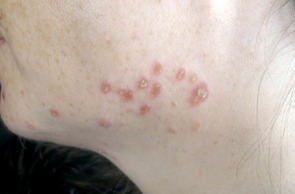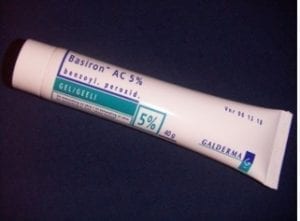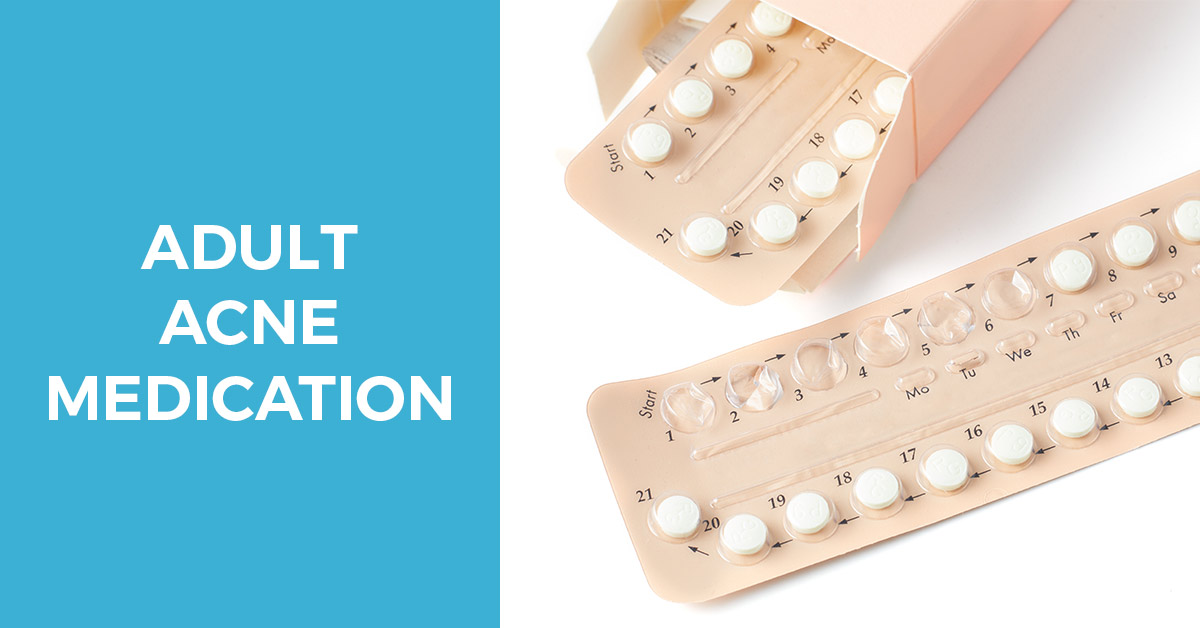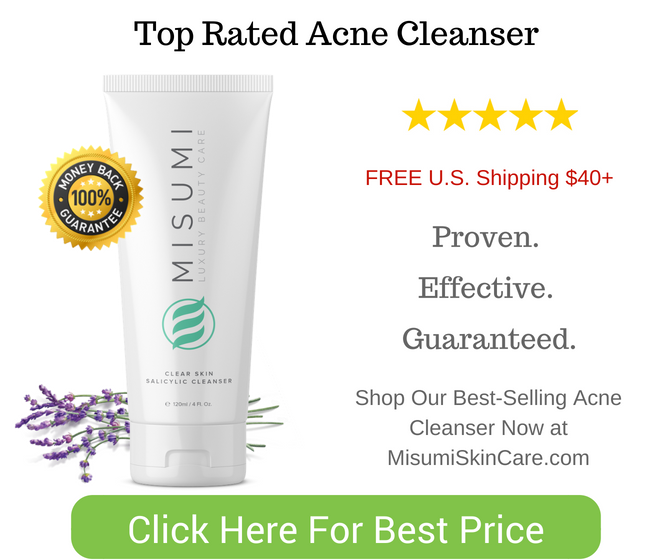Do you ever look in the mirror and declare, “I’m too old for spots!” Well, you’re not alone. Adult acne isn’t just something that affects teenagers because people of all ages are prone to breakouts, bad skin, and pimples nestled among wrinkles!
In fact, according to research conducted by the University of Alabama at Birmingham:
- 42.5% of men and 50.9% of women in their 20s will suffer from adult acne
- 20.1% of men and 35.2% of women in their 30s will suffer from adult acne
- 12% of men and 26.3% of women in their 40s will suffer from adult acne
- Even 7.3% of men and 15.3% of women in their 50s will suffer from adult acne
You’ve probably also noticed something else – acne is more prevalent in women than men. And that’s no coincidence. Regardless of what age you are, acne is related to your hormones and because a woman’s cycle (including menstruating, pregnancy, and menopause) creates fluctuations in these hormones, they’re much more likely to suffer from acne throughout their 20s, 30s, 40s, and 50s.
Thankfully, however, medicine for adult acne is available, and we’ll explore these, their side effects, and when medicine is necessary, below.
During your teens, you’re likely to see lots of whiteheads, blackheads, and pimples on your face, particularly in the forehead area. You may also notice the odd cyst on your back and chest. That’s because your skin tends to be oilier when you’re younger, which means you’re more likely to get clogged pores then than you are now as an adult.
In adult acne cases, the spots tend to appear around your mouth or jaw line, on the lower part of your face. And, unlike the finer pumps of teenage acne, you’re more likely to get red papules and deeper nodules that are tender to the touch.
What is Medicine for Adult Acne?
To answer the question, “What is the best medication for acne?” it will depend on the severity of your case. You may also need to wait several months before you start to see noticeable improvements from your treatment.
For example, if you’re just suffering from a few spots, whiteheads, or blackheads, over-the-counter creams or gels should be able to get rid of them effectively. These solutions often contain benzoyl peroxide and are known as “topical treatments.”
However, if your acne is more severe and has spread, you may need a prescribed medication. Signs you may need to seek the advice of your doctor include:
- You have a lot of pustules and papules
- You’ve tried over-the-counter medication and it hasn’t worked
The types of medications your doctor can prescribe you for acne include:
- Azelaic acid
- Topical retinoids
- Topical antibiotics
- Antibiotic tablets
- Oral contraception (for women)
- Spironolactone (for women)
- Isotretinoin tablets
If your case of acne is deemed severe, your doctor may refer to you a dermatologist for expert treatment. This can include if you have painful nodules or there are a large number of pustules and papules on your back and chest as well as your face. 
In these types of cases, combining topical treatments with antibiotic tablets will usually be the first line of treatment. If these don’t work, you may be prescribed isotretinoin.
Equally, for women who have acne, the combined oral contraceptive pill or hormone therapies can be effective. However, if you’ve changed to the contraceptive implant or progestogen-only pill, this may make your acne worse.
A lot of the treatments mentioned in this guide can take up to three months to take effect. That’s why it’s important you’re persistent and patient with each treatment.
→ Using Benzoyl Peroxide
This works like an antiseptic to reduce how much bacteria’s found on your skin’s surface. It also has anti-inflammatory properties and helps to reduce the amount of blackheads and whiteheads you may be suffering from. 
Normally available as a gel or cream, this treatment will be administered once or twice a day and you should apply it 20 minutes after you’ve washed all of the areas of your face/body that’s affected by breakouts.
When undergoing this treatment, you should use the ointment sparingly because too much can cause irritation to your skin. It also makes your skin much more sensitive to the sun’s rays, so you’ll need to wear sunscreen, avoiding too much exposure to the sun or ultraviolet light (UV). It also has a bleaching effect so avoid getting it on your clothes or hair.
Common side effects of benzoyl peroxide are:
- Tense, dry skin
- Stinging, itching, or burning sensations
- Some peeling and redness of the skin
These side effects tend to be mild and should disappear once you’ve finished the treatment. This treatment normally lasts for around six weeks, but you may be advised to use the cream/gel infrequently to prevent your acne from coming back.
→ Using Topical Retinoids
These work by exfoliating your skin, getting rid of any dead skin cells from its surface. This helps stop them from blocking up your pores, which can lead to acne.
Some common topical retinoids include adapalene and tretinoin, which are available as a cream or gel and are usually applied at night before you go to sleep. Simply apply to the affected parts of your face 20 minutes after you’ve washed it.
Again, topical retinoids affect your skin’s sensitivity to the sun so you will need to wear sunscreen when using this medication. This type of medication isn’t suitable when you’re pregnant because there’s a risk of birth defects.
Common side effects of topical retinoids include stinging of the skin and mild irritation. This is also a six-week course, and you may need to use this infrequently afterward to prevent your acne from returning.
→ Using Topical Antibiotics
Available as a gel or lotion that you apply up to twice a day, topical antibiotics target the bacteria on your skin that can cause infections within your pores. It’s normally recommended to follow a six- to an eight-week course but the treatment does have to stop after this period of time. That’s because there’s a risk that the bacteria will start to resist the properties of the antibiotics. If it does, it could cause more infections and could worsen your acne.
Side effects of topical antibiotics aren’t common but include:
- Peeling of the skin
- Burning or redness of the skin
- Some mild irritation
→ Using Azelaic Acid
If you find that you’re having painful or irritating side effects to topical retinoids or benzoyl peroxide, you may be prescribed azelaic acid. This is an alternative treatment that kills bacteria and gets rid of dead skin. It’s available in gel or cream form and is normally applied twice a day . However, if you have sensitive skin this may be reduced to once a day. Results tend to be seen after around a month.
This medication doesn’t increase your skin’s sensitivity to sunlight so you can go out in the sun.
The side effects of azelaic acid tend to be mild but can include:
- Red skin
- Dry skin
- Itchy skin
- Stinging or burning skin
→ Using Co-cyprindiol
This is a hormonal treatment that’s reserved for more severe cases of acne that don’t respond to antibiotic treatments. It helps reduce how much sebum (natural oil) your skin produces, reducing the risk of blocked pores that can lead to acne.
To notice a significant improvement in your acne, you may need to use this medication for two to six months. And there’s also a small risk that breast cancer can develop later on in life in women who are taking co-cyprindiol. There’s also an even smaller chance that this medication can cause a blood clot.
If you’re breastfeeding or pregnant, co-cyprindiol isn’t thought to be safe. That’s why you may be asked to take a pregnancy test before you embark on this treatment program.
Other side effects include:
- Weight loss or gain
- A lower sex drive
- Mood changes
- Tender breasts
- Headaches
- Spotting and bleeding in between periods, often occurring during the first few months of your treatment
Adult Acne Medication – Antibiotics
In cases of severe acne, a topical treatment along with antibiotic tablets may be recommended. In the majority of cases, tetracyclines (a certain class of antibiotics) are prescribed, unless you’re breastfeeding or pregnant. If so, you may be prescribed erythromycin, another antibiotic that’s safer for you to use.
When using antibiotics to treat your acne it can take up to six weeks before any improvements are visible. How long your treatment lasts will also depend on your reaction to the treatment with courses ranging from four to six months.
Tetracyclines can make your skin more sensitive to UV light and sunlight, and, during the first few weeks of the treatment, they can also hamper the effectiveness of the oral contraceptive pill. During this time, alternative contraception will be needed.
Adult Acne Medication – Hormonal Therapies
These treatments can benefit women who are suffering from acne, particularly if breakouts occur when you’re menstruating. Acne can also be associated with hormonal conditions, including polycystic ovary syndrome.
If you aren’t already taking it, the doctor may prescribe the combined oral contraceptive pill, which can often reduce acne in women. However, the results can take up to one year to appear.
Adult Acne Medication – Spironolactone
Even though Spironolactone is a drug that was designed to help people with high blood pressure, it has been found to help women with acne too.
One of the hormones that can cause a breakout is testosterone (a male hormone), and this can cause your oil glands to start over-producing sebum, thus increasing your risk of developing spots. However, spironolactone can decrease your testosterone levels, reducing the havoc it causes to your skin. It has also been found to have an anti-bloating effect on some women, too, which is a bonus.
There are some side effects with taking this acne medication, including spending more time running to the toilet because the drug is a diuretic. And your body will also retain more potassium, so you’ll need to go steady on foods that are high in this, including bananas, salt substitutes, and coconut water. Equally, if you have low blood pressure, are pregnant, or you’re male, this drug is not suitable.
You can also check out Ashley’s before and after pictures in the video below, as she discovered that Spironolactone was the only thing that worked for her having suffered from acne for years.
Adult Acne Medication – Isotretinoin
There are a number of advantages to isotretinoin, including:
- It reduces swelling and redness around spots
- It decreases how much bacteria is found on your skin
- It helps stop your follicles from getting clogged
- It helps reduce and normalize how much sebum your skin produces
However, with these benefits come a number of side effects. That’s why isotretinoin is only recommended when the case of acne is severe and hasn’t responded to any of the above treatments.
Due to the side effects associated with this medication, it can only be prescribed by a specialist dermatologist or doctor. It’s taken in tablet form and the course tends to last from four to six months. During the first week or so of your treatment you may notice your acne getting worse, however, after this, it should settle down again.
Common side effects of isotretinoin include:
- Blood in your urine
- Conjunctivitis (irritation and inflammation in your eyes)
- Blepharitis (inflammation of your eyelids)
- Changes to your blood sugar levels
- Cracking, dryness, and inflammation of your nostrils, lips, and skin
Some of the rarer side effects are:
- Kidney disease
- Pancreatitis (inflammation of the pancreas)
- Hepatitis (inflammation of the liver)
Due to the rarer side effects of isotretinoin you will need to have blood tests before and during your treatment plan.
Birth Defects and Isotretinoin
If you’re a woman who’s of childbearing age:
- You shouldn’t use isotretinoin if you think or you are pregnant because it will damage your unborn baby
- You should use at least one (preferably two) methods of contraception for a month before you start your treatment, throughout your entire treatment, and for a month after it has finished
- You will need pregnancy tests before, during, and after your treatment
When taking isotretinoin you’ll be asked to sign a form that confirms you have understood the risks involved in taking it, and that you’re willing to take contraceptives to prevent this from happening – even if you’re not sexually active at this stage.
If, while you’re taking isotretinoin, you think you’ve become pregnant, you should seek medical advice straight away. And you shouldn’t take this medication while you’re breastfeeding.
To hear more advice on Isotretinoin, we’ve included a short video below where two physicians and a nurse discuss the drug, its side effects, and when the medication is necessary.
Conclusion
If you are concerned about your skin and you don’t feel as though over-the-counter medication is working, you should consult a specialist dermatologist or your doctor for their professional advice.
Have you had adult acne or are you currently on a treatment program? What has or hasn’t worked for you? We’d love to hear about your experiences with adult acne medication – please share your comments below!



